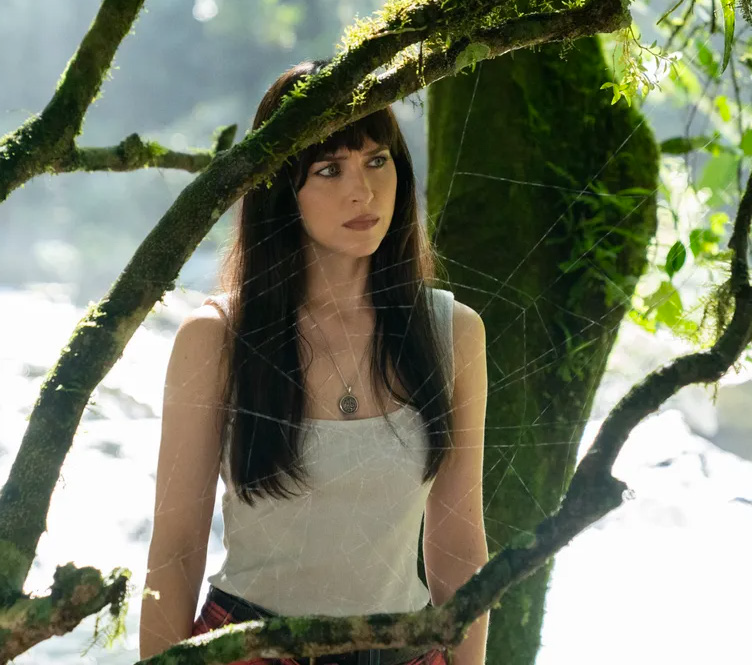
Biased statement: I love terrible movies. I think there is inherent value in recognizing what doesn’t work in a film, as painful a process as that may be. Admittedly, the bar was set extraordinarily low for S.J. Clarkson’s 2024 spider-person origin story, “Madame Web.” With a whopping twelve percent on Rotten Tomatoes, and a grade of 26 on Metacritic, it’s safe to say that the world has not been kind to “Madame Web.” Oft derided on social media as an unfinished cash-grab, I was excited to experience this cinematic landmark for myself.
“Madame Web” was an engaging movie. A deeply flawed, yet engaging movie. Problems crop-up almost immediately. The prologue for the film, set in a Peruvian rainforest, is a tacky, clunky exposition dump. We are introduced to Tahar Rahim’s character, Ezekiel Sims, in a performance so outrageously hammy that I could not invest any serious interest in this film beyond the three minute mark. The following action scene seems stuck in 2005 — very Matrix-esque, with digital pans that are initially off-putting. While I came to appreciate the flair in Leigh Folsom’s editing, the introduction of “Madame Web” was so egregiously offensive that I can’t blame audiences for writing off the entire film on account of its opening sequence.
Things progressively get better until the film fizzles out to a conclusion. Dakota Johnson gives a great performance as Casey Webb, a New York City EMT who discovers her latent clairvoyant powers. Johnson’s take on Webb is endearing, albeit abrasive and apathetic for the majority of the movie. Webb is not exactly a likable character in the script, but Johnson’s performance is grounded enough for some real humanity to seep through the corporate filter. The same can be said for Sydney Sweeny and Isabela Merced, who do their best with what they are given — both embody the characters authentically, but are hindered by poor writing. This was most apparent with Celeste O’Conner’s character: she’s written like a schoolyard bully in a musical, given lines that simply cannot be delivered with any sort of wit or panache. It’s not O’Conner’s fault that the script stinks; however I felt like her character dragged down the chemistry of the main trio.
This is not to say that there’s much chemistry here. To Clarkson, “character development” is synonymous with “bickering.” When we meet the three spider-women-to-be, we come to understand them through pedantic arguments and forced conflict. Their relationships feel contrived, they stem from the story as opposed to their interactions as people. Johnson’s role as a mother-figure to the girls is conveyed well enough, but this conflicts with the indifferent disdain demanded of her by the script. At its most basic level, I think Johnson brings the best out of the Spider-Women, but glaring flaws are immediately apparent in how these characters have been constructed.
I found the setting of Madam Webb objectionable. Casey Webb works as an EMT in Manhattan in 2003 — it would be difficult to divorce the city in this era from a particular event. Especially considering how the PATRIOT Act is the true impetus for the plot; Ezekiel, plagued by nightmares in which he is bested by three Spider-Women, can only begin his search with the help of newly implemented facial recognition software, from Homeland Security. Of course, you couldn’t have a Spider-man story set anywhere other than New York City. But why did this have to happen in the early-2000s? I wasn’t expecting 25th Hour, but as a New Yorker, it’s hard to reconcile such a cheery depiction of the city with the reality of historical circumstance, of events which actually propelled the plot of the film.
The setting of this film is totally arbitrary: the time period is a decoration, an audiovisual garnish. The world of “Madame Web” lacks substance: Adam Scott’s character Ben Parker claims he served as a medic in an overseas war, yet this passing mention has no bearing on his character whatsoever. Clarkson is more concerned with the idea of the 2000s: American Idol and Martha Stewart, Beyonce and Blockbuster Video. And I must say, she does succeed in getting the look right — I was enamored with the Y2K stylings of Clarkson’s world. Yet, the story could occur in 2024 without any issue; things would probably make more sense that way.
Perhaps the most egregious failing of “Madame Web” is the lack of Spider-Woman action. The two short scenes we get of the Spider-Trio are really cool, yet they comprise only three minutes of a one hour, 40 minute runtime. For what it’s worth, I enjoyed the action sequences a lot here — Rahim is goofy as Ezekiel, but properly terrifying in costume, with a rigid, malicious physicality. After hearing many complaints about the lack of action, I was pleasantly surprised by the quality of the chase sequences in “Madame Web.” I think this has to do with the editing; “Madame Web” is a well edited movie if you can tolerate camp. If you enjoy films like ’05 Fantastic Four or Daredevil, you’ll like this film. Casey’s clairvoyance is communicated well — like in Easy Rider, we see scenes unfold before they actually occur. This involved the viewer in a really cool way, with the audience working through the puzzle of the vision alongside Casey. The psychedelic spacey-visuals were also up to snuff. Nothing like Doctor Strange, but enough to get your fix if that’s your bag. I was surprised by how much worked here.
I could recommend “Madame Web.” At the very least, watch it with your friends and deride it late on a Saturday night. It is both just as bad and better than you’ve heard it is. The film is far from good, but you’ll certainly be entertained.
















